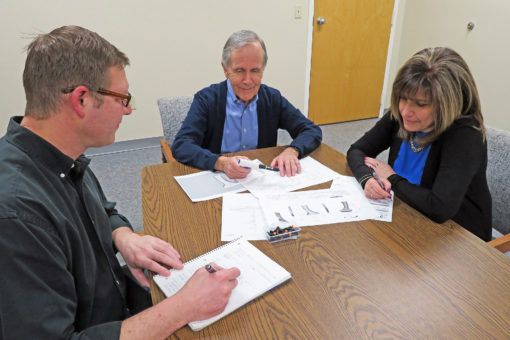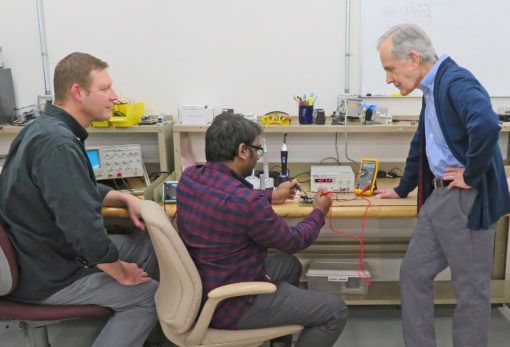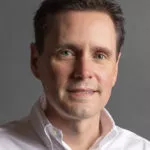Engineer, entrepreneur and dentist Dr. Joshua Friedman on becoming a light-curing pioneer, founding three startups and steering the invention process.

THE ENGINEER: Dr. Joshua Friedman (above, middle) pores over diagrams and product prototypes with his AdDent team.
I’M A HANDS-ON engineer. Even as a kid, I enjoyed it. I was ª HAM radio operator and built every set myself. I went to vocational and technical high school. While my friends were earning the minimum wage in summer jobs, I lied my way into a job as an electronics technician, first by fixing radios and TVs, and eventually working for aerospace companies.
I never thought I’d go to dental school.
A big part of my decision was curiosity about how to use my engineering skills in dentistry. You can’t know how to design something if you don’t understand it from the end user’s perspective. I practiced in New York City for a number of years, though never full-time, and I devoted myself more to engineering as the years went on.
I started a company called Electro-Lite, which focused on light curing and bonding of substrates for industrial applications like medical, optical, automotive and aerospace.
My thought was to merge industrial and dental, but I ended up selling [the company] to our employees to focus strictly on dental.
Years ago, a doctor came to me and told me that a curing light needs to be the size of a No. 2 pencil. When I started Demetron Research Corporation, we couldn’t make it that small because the technology wasn’t available yet, but we did make it a lot better. The handheld curing light put Demetron on the map.
Almost all curing lights degraded in performance, but no one knew it. Dentists always thought, “I know my curing light is working because I can see the light.” The radiometer was developed at Demetron because we knew there was a problem that needed a solution. We visited 300 offices, and it turned out that nearly all the lights we tested showed subpar performance.

I misjudged how hard it would be to start AdDent. I thought, “OK, I’ll just start another company.” I misjudged how hard that would be. It’s different in your fifties than in your thirties, because startup entrepreneurs have to do everything. Luckily, by that point, I wasn’t in it to make money. I do it because I love it. Nothing excites me more than seeing ideas turned into products that help the dentist.
There’s an old saying: If an engineer runs a company, the products are usually great, but no one knows about them. If a marketer runs a company, the products are famous, but maybe not so great. Because I’m an engineer, I focus more on making great products, but as a leader, I have to find a balance.
There’s a big difference between physicians and dentists: Dentists don’t charge for diagnostics. Yet diagnosing a problem in medicine is often the hardest, most time-consuming part of treatment. That’s a fundamental barrier that all of dentistry needs to be thinking around.
Dr. Joshua Friedman is the founder and president of AdDent, founder of Demetron and a trailblazer in light-curing technology. A dentist, electrical engineer and formerly an assistant research scientist at New York University College of Dentistry, he holds more than 30 U.S. and international patents, with others pending.




